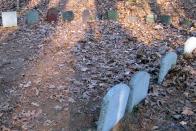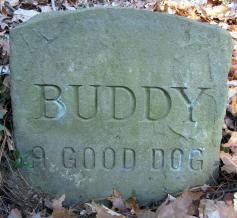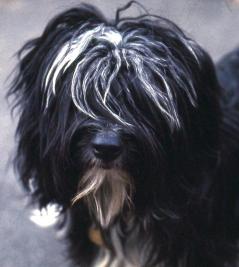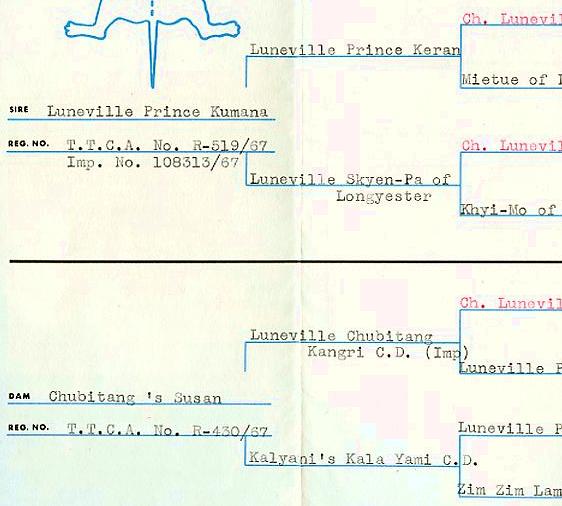
Most people remember their pets as members of their families. One of the topic threads in my blog is the *PEOPLE thread, which contains entries dealing with specific individuals. But I include in that thread non-human animals who were or are family members, like Harold, and now Chester.
Actually, his full name was "Chesterton of Prin-Su", and I can trace his lineage one generation further back than that of my own family. When we bought him from his breeders Bill and Alice Smith, we received a certificate naming all his ancestors going back four generations. Chester's sire was "Luneville Prince Kumana", a dog who answered to the call name "Prince". And his dam was "Chubitang's Susan", who came when you called "Sue". Hence the breeders, Bill and Alice Smith, called their business "Prin-Su Tibetan Terriers". Copying the fancy names of his ancestors, I made our new dog's official name "Chesterton of Prin-Su", and his "call name" just plain "Chester" Below you can see a portion of the genealogical certificate we received, showing Chester's parents and grandparents. Click on it to see the entire certificate. In most browsers, you then click on the picture to enlarge it. You can then return here using your browser's "Back" button. In the red entries, the "Ch." means "Champion". We brought Chester back to our Watertown apartment, and set up his bed in our own bedroom. Of course, he was unhappy with this, and wanted to sleep with us, up on our bed. But at only six weeks old, he was too small to jump up onto it, and had to settle for his cushion, or the floor. Not too long after we turned in and turned out the lights, I heard some frantic scratching noises, and a lot of plaintive whining from Chester. I figured he was still complaining about not being able to come up on the bed, so I ignored him. This was followed by some more scratching, and some more whining, and then some more scratching, and then some more whining. Finally, I gave in, and turned on the light to see what was going on. Apparently, in trying to settle himself in for the night, Chester had gotten completely wrapped up in the telephone cord. Perhaps he had done this following the doggie habit of turning in circles a few times before lying down. In any event, it was all wrapped around his neck and his legs, and he could barely move. I carefully unwrapped him and put the cord out of reach, after which we were able to go to sleep. When Chester got older, he became able to jump up onto the bed by himself, but also became satisfied sleeping in his own bed. We discovered just how high he could leap the hard way. We came home one day to find that he had jumped all the way up to the kitchen counter, and of course countertop height is considerably higher than the height of a bed or a table. This was a problem because on the kitchen counter, we were thawing a pork roast. Chester had eaten a good deal of it all around its periphery, although it was still frozen solid in the center. And this wasn't the only time Chester had jumped up on the table or higher. When we left him with a friend willing to look after him while we were on a short trip, she remarked when we returned, "I knew he was an only dog when I came home and found him standing on the dining room table." He had a better view out the window from there. Our apartment in Watertown was a duplex, meaning we lived on the first floor and slept on the second. Its only bathroom was on the second floor, at the head of the stairs. One day I found Chester trotting down the stairs, and noticed that he seemed to have a piece of white paper in his mouth. I looked to see what it was, and found it to be a piece of toilet paper. I then looked behind him, and saw that the toilet paper continued all the way up the stairs and into the bathroom. The toilet paper roll was on the far wall of the bathroom. Chester had grabbed a piece of toilet paper hanging from the roll, and carried it downstairs. This of course unrolled a stair-length strip of paper. I was always surprised that Chester could get around so well, given that his long fur seemed to cover his eyes. But then one day, I put my head right down against the ground in front of him, and I could indeed see his eyes from that viewpoint. Apparently, the only vision he needed was to be able to see just a little bit of the ground right in front of him. Perhaps when running he lifted his head to see a little bit further into the distance. It's said that dogs don't have very good vision. They use other cues, and in particular their strong sense of smell, to navigate. After we left our Watertown apartment, and bought a house in Wayland, we irresponsibly let Chester run freely around the neighborhood. He didn't seem to get into too much trouble, but on one occasion he came home completely blinded by burrs. These were the seeds of a plant called a "burdock". They are round seed pods about the size of a small grape, spherical, and covered with tiny hooks, just the sort of seed that inspired the hook-and-loop fastener called Velcro®. He had apparently run through a burdock bush, and the burrs were stuck to him all over his body. In particular, the long hair over his eyes was plastered to his face. He was effectively blind. This had apparently not prevented him from finding his way home. As noted above, dogs are not dependent on good vision, but can get around using scent and other cues. I probably spent an hour or so combing the burrs out of his fur. Chester may have had an excellent sense of smell, but I myself don't. Due to general allergic rhinitis, I don't have good airflow over the smell receptors in my nose. Although I have a reasonably good sense of taste (which does involve smell, but in the back of the mouth), I barely have a sense of smell at all. Thus, unbelievable as it may seem, I smelled nothing peculiar when I let Chester into the house late one evening after he had been sprayed by a skunk. I did notice that he seemed to be rubbing his face on one of our rugs. I found that curious, but still didn't understand what was going on. I brought him into the bedroom, where he began to vigorously rub his face on another rug. He then jumped up onto the bed, and started rubbing his face on our quilt. At this point, Margie woke up from a fairly sound sleep. The odor was so overwhelming that her first reaction was that the house was on fire. When she got a little more alert, the odor told her exactly what had happened. We washed Chester as best we could that night, but he still reeked the next morning (at least, according to Margie). We called the vet, wondering if the office would recommend the use of the most common folk remedy, a bath in tomato juice. But the vet's assistant had a different suggestion. Lowering her voice into a conspiratorial whisper (I imagine so that it would not be heard by other people in the waiting room), she said, "Get this: Massengill® douche powder." That's what we used, and it worked. A local dry cleaner took care of the two rugs and the quilt. He dry-cleaned them once in used dry-cleaning fluid, just before it was about to be discarded after long use. He then dry-cleaned them a second time, and the two cleanings completely removed the odor. It never happened again, so we presume that Chester learned to stay away from skunks. Or perhaps he just never met another one. Once I started listing stories I could write about Chester, it became clear that it was going to take three blog entries to tell them all. This is the first. For the second, see #0115, Chester (bis).   Note 1:
One of the animals buried there is a monkey named "Simi", which Frank Paine found orphaned in Africa. See the Wicked Local Wayland article "Traditions has served many roles through the years". [return to text]
 |

 The headstone that I like the most, seen in the picture to the right, has the simple inscription, "Buddy - a good dog". What better epitaph can a dog possibly have? If Buddy is looking down from that great dog park in the sky, he can ask for nothing more than to hear his master saying "Good dog!"
The headstone that I like the most, seen in the picture to the right, has the simple inscription, "Buddy - a good dog". What better epitaph can a dog possibly have? If Buddy is looking down from that great dog park in the sky, he can ask for nothing more than to hear his master saying "Good dog!"

